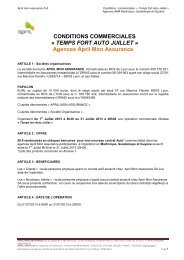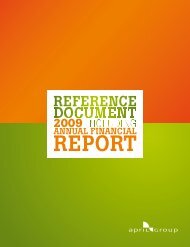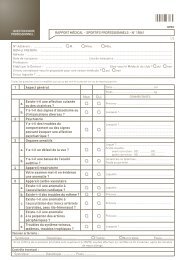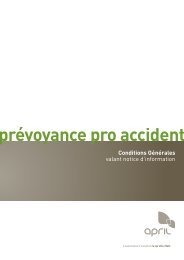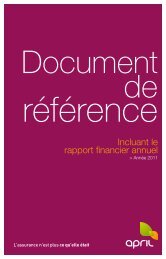2007 - April
2007 - April
2007 - April
You also want an ePaper? Increase the reach of your titles
YUMPU automatically turns print PDFs into web optimized ePapers that Google loves.
2.0<br />
General information on the company and its share capital<br />
2.1.12. Identification of bearer shareholders<br />
Pursuant to legal and regulatory requirements, the company<br />
may at any time ask the responsible clearing organization<br />
for the name, nationality and address of holders of bearer<br />
shares in the company entitling them immediately or at<br />
a later time to a vote in General Meetings, as well as the<br />
quantity of shares held by each one, and if necessary, any<br />
restrictions to which the said shares may be subject.<br />
2.1.13. Distribution of profits (Article 29 of the<br />
company bylaws) and payment of dividends (Art. 30)<br />
The amount needed to create the legal reserve under the<br />
terms and conditions provided for by the law is withdrawn<br />
from fiscal year profits less any prior year losses as relevant.<br />
Distributable profit comprises profit for the fiscal year less<br />
former years’ losses and any amounts placed in reserves<br />
pursuant to law and company bylaws, plus retained earnings.<br />
The General Meeting votes on the allocation of distributable<br />
profits. It decides on the portions that will respectively be<br />
allocated to reserves, shareholders in the form of a dividend,<br />
and retained earnings.<br />
For all or a portion of the dividend paid or advances on<br />
dividends, the General Meeting has the option of granting<br />
each shareholder the choice between payment of the<br />
dividend or advances on the dividend in shares or cash under<br />
the terms and conditions provided for under French law.<br />
Article L.27 of the French state domain code (Code du<br />
Domaine de l’Etat) specifies that dividends relating to shares<br />
are in principle subject to limitation by a lapse of time further<br />
to a five-year period. Dividends that have reached the end of<br />
the five-year limitation period must be paid back to the State.<br />
2.1.14. Company management and supervisory bodies<br />
Executive management (Article 15 of the company<br />
bylaws):<br />
Executive management is performed, under his responsibility,<br />
either by the Chairman of the Board of Directors or by<br />
another individual selected from among the Board members<br />
or externally, serving as the Chief Executive Officer.<br />
The Board of Directors chooses between the two conditions<br />
for the performance of executive management. It may<br />
modify its choice at any time. In each case, it notifies the<br />
shareholders and third parties in accordance with the<br />
regulations in force.<br />
If the Chairman performs the functions of the Chief Executive<br />
Officer, the provisions of these bylaws relative to the Chief<br />
Executive Officer will apply to the Chairman.<br />
When executive management functions are not performed<br />
by the Chairman of the Board of Directors, the Board<br />
of Directors appoints a Chief Executive Officer, subject<br />
to the same age limit as that set for the Chairman.<br />
The Chief Executive Officer is invested with the broadest<br />
powers to act in the Company’s name under all circumstances,<br />
within the limits of the corporate purpose and subject to the<br />
powers expressly granted under French law for Board of<br />
Directors and shareholder meetings.<br />
As proposed by the Chief Executive Officer, the Board of<br />
Directors may appoint from one to five Deputy Chief Executive<br />
Officers. The age limit for serving as Chairman also applies to<br />
positions as Deputy Chief Executive Officers.<br />
In relation to third parties, the Deputy Chief Executive Officers<br />
have the same powers as the Chief Executive Officer.<br />
In line with the company’s internal organization, the powers<br />
of the Chief Executive Officer and Deputy Chief Executive<br />
Officers may be limited by the Board of Directors, although<br />
such a limitation is unenforceable against third parties<br />
Board of Directors (Article 14 of the company<br />
bylaws):<br />
The Company’s administration is handled by a Board of<br />
Directors made up of a minimum of three and a maximum<br />
of 18 members; however, this maximum number may be<br />
increased to 24 in the event of a merger under the legal<br />
conditions in force.<br />
If the capital held by employees of the company and affiliates<br />
in connection with the company savings scheme represents<br />
more than 3% of the share capital, a Director is appointed<br />
under the conditions set by French law and the regulations<br />
in force from among the employee shareholders or the<br />
employees who are members of the Supervisory Board of the<br />
company mutual fund holding the shares. Such a Director is<br />
not taken into account when determining the minimum and<br />
maximum numbers of Directors.<br />
Except for cases when not required under French law, each<br />
Director must own at least one share.<br />
Return to the contents section<br />
8




